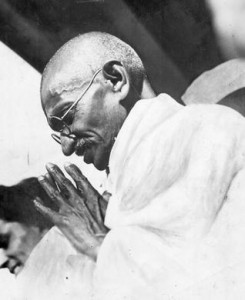January 30
 “By a long course of prayerful discipline, I have ceased for over forty years to hate anybody. I know that this is a big claim. Nevertheless, I make it in all humility.”
“By a long course of prayerful discipline, I have ceased for over forty years to hate anybody. I know that this is a big claim. Nevertheless, I make it in all humility.”
–Gandhi (Young India, 6-18-1925)
While Gandhi said that he ceased to hate anybody, he never denied hating the acts of people. He learned simply that in order to help them change their ways, to right the wrong of their actions, he had to dissociate people—every one of whom has worth because they are a human being– from their deeds. This is the challenge–what is simple is not easy.
Gandhi emphasizes that it requires discipline to move beyond hatred of people — more than just any kind of discipline, a prayerful one resting on a faith in the basic humanness in all people. Discipline is the key word. When we become aware of hatred in our minds, it is our duty to interrupt hate-filled thoughts before they become words or deeds. Better deeds would follow naturally from a mind freed from hatred; we would recondition our reactions toward separation and passivity to a more active state of seeking unity with whomever we’re dealing with.
If we are to discipline ourselves in this way, and liberate ourselves from the corrosive influence of hating, we can take a clue from the wisdom of Buddha, “to conquer hatred, train the mind in love.” Nonviolence—and nonviolent resistance– is the outward form of that training.
Experiment in Nonviolence:
The next time you find yourself feeling hatred for another person, attempt to redirect your focus to hating what they are doing, without hating the person. How does it change your perspective on the solution to the problem?
Daily Metta 2015, a service of the Metta Center for Nonviolence, is a daily reflection on the strategic and spiritual insights of Mahatma Gandhi in thought, word and deed. As Gandhi called his life an “experiment in truth,” we have included an experiment in nonviolence to accompany each Daily Metta. Check in every day for new inspiration. Each year will be dedicated to another wisdom teacher.








